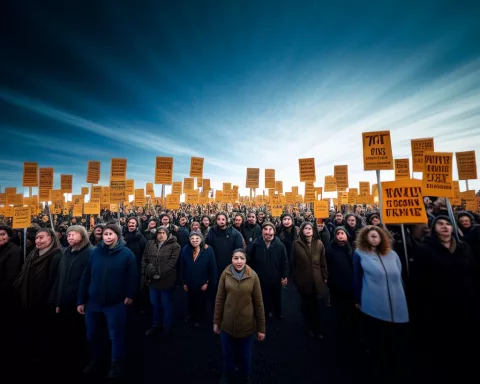South Africa’s budget announcement for 2025 was delayed, leaving the nation in suspense. The hold-up is due to disagreements among ministers about raising the VAT tax, which many believe would hurt the poor even more. While some are worried, others see this delay as a small win, giving the government time to reconsider its decisions. On the streets, people marched together, shouting for economic fairness and better support for those in need. As they await the budget, citizens are united in their demand for policies that protect the vulnerable and promote a brighter future.
Why was South Africa’s 2025 budget announcement delayed?
South Africa’s 2025 budget announcement was postponed due to unresolved discussions among ministers regarding a proposed VAT increase. The delay reflects ongoing concerns about economic impacts and aims to address the needs of vulnerable populations, ensuring that policies do not exacerbate existing inequalities.
In a surprising turn of events, South Africa found itself grappling with the postponement of its 2025 budget announcement. Originally slated for delivery by Finance Minister Enoch Godongwana, this unexpected delay has sent ripples of concern and relief throughout the nation. At its core, the postponement revolves around discussions of potential tax increases, particularly a controversial proposal to raise VAT, which has sparked significant debate among policymakers.
Unveiling the Delay: A Complex Financial Landscape
The announcement of the delay came from National Assembly Speaker Thoko Didiza, highlighting the intricate process of finalizing the budget. Despite the mounting anticipation, ministers, including members of the ruling African National Congress (ANC), had yet to reach a consensus, particularly on the contentious VAT increase. This proposal faced opposition not only within the cabinet but also from various sectors of society, as it was seen as regressive and detrimental to South Africa’s economically vulnerable populations.
Motlatsi Tsubane, the provincial chair of the Congress of South African Trade Unions (COSATU), succinctly captured the nation’s mixed emotions regarding the delay. While expressing disappointment, Tsubane acknowledged that the postponement offered a temporary respite from an immediate VAT hike, which had been rumored to be as high as 2%. Describing it as a “blessing in disguise,” Tsubane underscored the potential hardships a VAT increase would impose on a country already grappling with high unemployment and stagnant economic growth.
As the streets of Cape Town filled with a chorus of discontent on the day of the postponed announcement, hundreds of citizens marched, unified in their demand for a budget that prioritizes the needs of South Africa’s most vulnerable. The procession drew together a diverse coalition of organizations, including COSATU, the South African Federation of Trade Unions (SAFTU), Equal Education, and the People’s Health Movement, each amplifying the collective call against further budget cuts.
Voices from the Streets: A Cry for Economic Justice
Among the demonstrators, Zwelinzima Vavi, general secretary of SAFTU, delivered a powerful message to the gathered crowd. He condemned VAT as a regressive tax that disproportionately affects the poor, leading the chants of “Phantsi, VAT, phantsi”—a rallying cry for economic justice and fair taxation. VAT’s regressive nature, protesters argued, exacerbates inequality by placing an undue burden on those with the least financial resilience.
The protest extended beyond the issue of taxes, serving as a broader critique of the austerity measures that have strained South African society. Noncedo Madubedube, general secretary of Equal Education, presented a petition listing demands that resonated with the assembled masses. Calls for affordable essentials like food and fuel, increased funding for public safety, and filling vacancies in education and health sectors highlighted the priorities of the community. The petition also urged the government to commit to a Basic Income Grant (BIG), envisioning a system that would provide universal social protection and resist the privatization of public utilities like Eskom and Transnet, which many feared would increase inequality.
The impact of the demonstration was evident when National Treasury Deputy Director-General Stadi Mngomezulu engaged with protesters, promising to deliver their petition directly to Minister Godongwana. His commitment to facilitating a response underscored the power of collective action and its potential to influence policy decisions at the highest levels.
A Nation’s Call for Equity and Sustainability
The People’s Budget Assembly, held at St George’s Cathedral before the march, echoed similar demands. Here, activists articulated the pressing challenges facing South Africa: widespread unemployment, food insecurity, and failing municipal services. The petition read at the assembly pierced to the heart of current grievances, questioning the rationale behind austerity in a nation where ten million people face hunger each week. It challenged the moral justification for cuts to essential services like healthcare and education amid such dire conditions.
Freda Oosthuysen, COSATU’s National Treasurer, highlighted the pervasive impact of spending cuts, stating, “Austerity measures strike everywhere, even when you buy a loaf of bread.” Her remarks emphasized the tangible effects of policy decisions on daily life, criticizing the lack of resources for policing and education and linking these deficiencies to rising unemployment and the unmet potential among graduates unable to find work.
For individuals like Nomacebo Mbayo, the struggle is deeply personal. As a waste picker who lost her formal job during the Covid-19 pandemic, Mbayo’s story reflects a broader narrative of economic hardship and resilience. Her experience underscores the urgency for government action on job creation, a sentiment echoed by Aliya Chikte from the Alternative Information & Development Centre. Chikte advocated for transforming the Social Relief of Distress grant into a Basic Income Grant, positioning it as a crucial step toward comprehensive social protection.
Reflection on South Africa’s Socio-Economic Landscape
This moment in South Africa’s fiscal history invites reflection on the broader socio-economic landscape. As the nation awaits the budget announcement, the collective voice of its people resonates with clarity: policies must prioritize equity and sustainability, resisting measures that exacerbate existing inequities. The narrative unfolds against a backdrop of historical struggle and resilience, a testament to the enduring strength of South Africa’s civil society.
In conclusion, the postponement of the 2025 budget announcement has sparked a nationwide dialogue about the future of South Africa’s economy. As citizens and leaders navigate this complex landscape, the emphasis remains on crafting policies that address the needs of the most vulnerable, ensuring a more equitable and sustainable future for all.
FAQ
Why was South Africa’s 2025 budget announcement delayed?
The announcement was delayed due to ongoing disagreements among ministers regarding a proposed increase in the VAT tax. The discussions aim to address economic impacts, particularly concerning the needs of vulnerable populations, and avoid exacerbating existing inequalities.
What are the main concerns regarding the proposed VAT increase?
Many critics, including citizens and organizations, believe that raising the VAT tax would disproportionately affect poorer communities. They argue that such a regressive tax would increase the financial burden on those who are already struggling, leading to greater economic inequality.
How do citizens feel about the budget delay?
The public reaction is mixed. While some express disappointment over the delay, viewing it as an obstruction to necessary financial planning, others see it as a temporary win. Many citizens believe this pause allows the government to reconsider its approaches and potentially avoid harmful tax increases.
What actions have citizens taken in response to the budget delay?
Following the announcement of the delay, citizens organized protests, marching in significant numbers to demand economic fairness and better support for vulnerable populations. Various organizations, including COSATU and Equal Education, participated in these demonstrations to amplify the collective call for equitable policies.
What are the key demands from protesters regarding the budget?
Protesters called for policies that prioritize essential needs, such as affordable food and fuel, increased funding for public services, and the establishment of a Basic Income Grant to ensure universal social protection. They also urged the government to avoid further austerity measures that could harm vulnerable communities.
How does this budget delay reflect broader socio-economic challenges in South Africa?
The delay has sparked a national dialogue about pressing issues such as unemployment, food insecurity, and inadequate public services. Many see it as a crucial moment to advocate for policies that promote equity and sustainability and to question the rationale behind austerity measures in a country facing significant socio-economic challenges.












